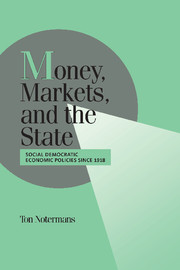Book contents
- Frontmatter
- Contents
- List of Tables and Figures
- List of Abbreviations
- Acknowledgments
- A Note on Terminology
- 1 Social Democracy in the Macroeconomy
- 2 Politics, Economics, and Political Economy
- 3 Why Was There No Social Democratic Breakthrough in the Twenties?
- 4 The Creation of the Social Democratic Consensus
- 5 The Breakdown of the Social Democratic Consensus
- 6 Social Democracy in the Twenty-first Century
- Notes
- References
- Index
- Title in the Series
2 - Politics, Economics, and Political Economy
Published online by Cambridge University Press: 17 September 2009
- Frontmatter
- Contents
- List of Tables and Figures
- List of Abbreviations
- Acknowledgments
- A Note on Terminology
- 1 Social Democracy in the Macroeconomy
- 2 Politics, Economics, and Political Economy
- 3 Why Was There No Social Democratic Breakthrough in the Twenties?
- 4 The Creation of the Social Democratic Consensus
- 5 The Breakdown of the Social Democratic Consensus
- 6 Social Democracy in the Twenty-first Century
- Notes
- References
- Index
- Title in the Series
Summary
POLITICS, POLICY PREFERENCES, AND ECONOMIC THEORY
Commonly, politics can be understood as a process in which competing groups try to affect the distribution of (political) goods in their favor, within a stable framework of rules and institutions. The analysis of policy making in such stable periods can generally be conducted fairly satisfactorily in terms of the relative political power resources of the competing groups. However, while institutions and policies usually tightly interlock, the cohesion of the institutional network seems to be radically weakened during certain periods. At those critical junctures in history, politics is mainly concerned with the reshaping of the framework of rules and institutions within which political competition is to take place.
In the field of economic policy making, regime changes are marked primarily by a reinterpretation of the relation between policy instruments and outcomes and a redefinition of the responsibilities of political actors. On a general level, two such different regimes can be distinguished. In liberal regimes, such as those of the 1920s and today, maintaining price stability is considered the foremost responsibility of the macroeconomic authorities whereas the causes of unemployment are primarily located in the functioning of the labor market, which implies that the social partners carry the main responsibility for it. In the social democratic regime, which historically separated the two liberal regimes, the assignment of instruments to outcomes is inverted: unemployment is interpreted primarily as a macroeconomic problem.
- Type
- Chapter
- Information
- Money, Markets, and the StateSocial Democratic Economic Policies since 1918, pp. 14 - 41Publisher: Cambridge University PressPrint publication year: 2000



